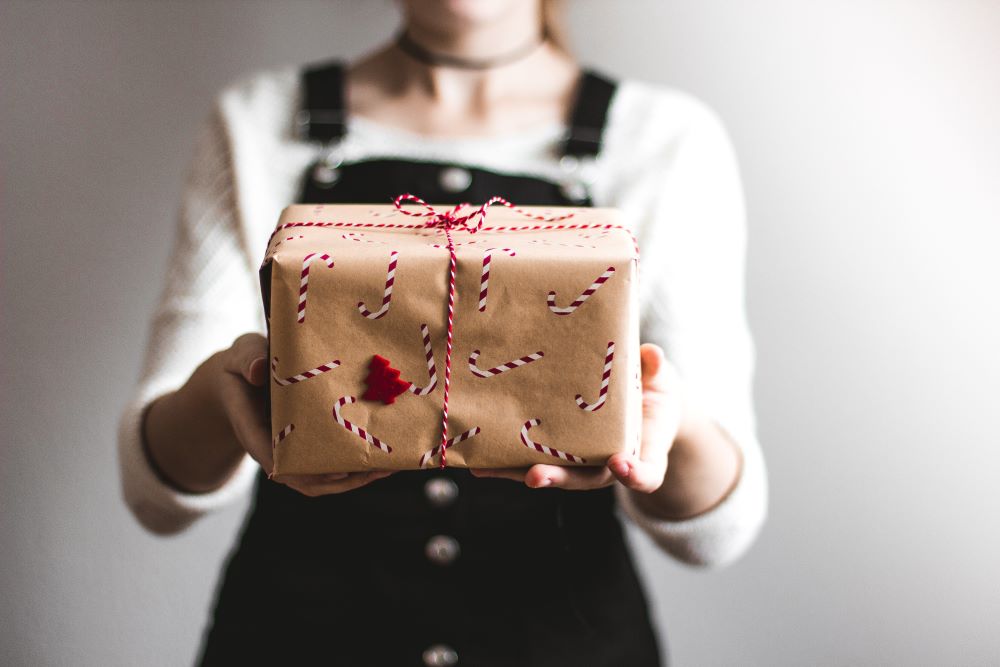
(Unsplash/Kira auf der Heide)
In the Gospel reading from St. Luke for the third Sunday of Advent, a crowd of people asks John the Baptist for guidance on how they should act. He replies, "Anyone who has two tunics must share with the one who has none, and anyone with something to eat must do the same." Here John the Baptist urges the people to distribute their wares — to give — to others.
We approach the Advent season with a clear call to give in mind. Yet we may find our desires to give to our friends and loved ones, and to our community, complicated this holiday season.
As we learn more and more about the degradation of the planet, we may feel conflicted by the hyper-consumptive systems in which we participate. As we sift through our belongings, we may wonder how to best give of them without causing environmental harm.
Above all, we may want to address the needs of our community but feel unsure how to connect with our neighbors given the precarity of the pandemic.
How can we approach the call to give, in the face of mounting environmental destruction and as we approach a third year of the coronavirus pandemic?
A Facebook group, of all things, can offer direction here.
Advertisement
When I first moved to Philadelphia in 2019, I became acquainted with the Buy Nothing Project. Founded in 2013, the project's mission is to "build community by connecting people through hyperlocal gifting, and reducing our impact on the environment." The Buy Nothing Project is organized around the ethos of a "gift economy." Everything shared on Buy Nothing — an item, a service or advice — is given freely, without charge.
Participating in Buy Nothing is simple. Neighbors can search Facebook for an active community nearby, request to join and, upon acceptance, begin to give, ask and receive. The project also recently released an app that can be downloaded to any mobile device.
I joined my first Buy Nothing group in the fall of 2019, but my participation was limited. When I moved into a new apartment during the summer of 2020, with the COVID-19 pandemic sweeping the world, I spent the first few weeks of August alone, struggling to adjust to a new neighborhood.
I felt compelled to seek out another Buy Nothing group, in part because I was eager to connect with people in my community and in part because I needed a watering can.
I shyly posted my request, and in the meantime, sifted through my moving boxes to see what I could offer my new community. I settled on a few drinking mugs; I posted photos to the page and waited. To my delight, comments began pouring in after an hour or so. I packaged each mug like a gift, wrote a quick note to each neighbor and left them on my porch.
Though much of my Buy Nothing interactions continue with minimal physical contact, to limit the risk of COVID-19 transmission, I have borne witness, albeit virtually, to the generous creativity of my neighbors.
I've watched neighbors leap into action to collect supplies to keep the local food pantry stocked with food. When Afghan refugees began arriving in Philadelphia, neighbors collected suitcases and baby carriages so incoming families could manage their journeys more easily. The enthusiasm, generosity and compassion of these communities are a sight to behold.
Not every "ask" is striking, nor every gift groundbreaking. But these exchanges don't need to be extravagant to reach the heart of the Gospel call to give. If a neighbor asks for a garnish to a recipe, three or four neighbors will respond. When I changed my diet to accommodate allergies, I was glad to see my innocuous pantry items — canned beans and quinoa — delight my neighbors. No matter how mundane, the gift is delighted in, and neighbors eagerly share their satisfaction with "posts of gratitude."
Most moving was my recent foray into holiday cooking. I spent this past Thanksgiving alone, and while endeavoring to cook a turkey breast for the first time, found myself intimidated by the task. After sharing my fears, I had several neighbors respond to share their cooking expertise.
One neighbor even emailed me a family recipe, including tricks on caring for the bird, and we exchanged photos throughout the day as we cooked, while I plated my sides in dishes given to me by other community members. Although my kitchen was empty, my meal was filled with the compassion of others, and my spirit filled to the brim with gratitude.
The lessons the Buy Nothing group offers to us are manifold. The group's commitment to the gift economy also gives way to a "green" ethic. My time in the group has transformed my view of what is "disposable." For instance, members share moving boxes, garden clippings and other items that I previously discounted as rubbish. Now when I receive an online order in a cardboard box, I post the box to the group instead of discarding it.
These exchanges don't need to be extravagant to reach the heart of the Gospel call to give.
Buy Nothing also encourages a "slow" disposition toward consumption. Membership does not guarantee being gifted — in fact, popular items often receive multiple expressions of interest from neighbors, and the gifter must choose one recipient. Gifters are encouraged to let their items "simmer," so more community members can have a chance to receive them.
This encouragement, though not required, eschews a "first-come, first-served" attitude. It also helps diffuse hyper-consumptive habits and lingering senses of entitlement.
Above all, this practice aids in discerning wants from needs. Members are encouraged to share the reasons behind their interest in an item, who it is for and other details. Several times, upon further reflection, I have rescinded my interest in a gift, especially after reading the comments. This has helped me resist impulsivity — something that I have previously struggled with in my purchasing habits.
Our culture is one of self-storage units and endless clutter. When we find ourselves overwhelmed by the mountains of "stuff" we have accumulated, we may be tempted to offload our belongings to donation sites. Sadly, much of what we donate ends up in domestic landfills, or in other countries, clogging their environments with unwanted excesses.
Buy Nothing is a more personal, less environmentally taxing alternative. This is not to say that these groups are a dumping ground for our impulse buys. Rather, they are a place for repurposing items and directly addressing need in communities.
If this holiday season finds you amidst a sea of clutter in your home, consider joining a Buy Nothing group, to draw nearer to your neighbors, aid (and be aided by) your community and pursue practices that honor neighbor and planet.
To find a group near you, those interested can search for a nearby group on Facebook, or download the Buy Nothing app. No matter where you live, you likely are within the boundary of a Buy Nothing group. If not, you might consider starting your own. Communities that lack a Buy Nothing group can easily start one by following instructions on the Buy Nothing website.








